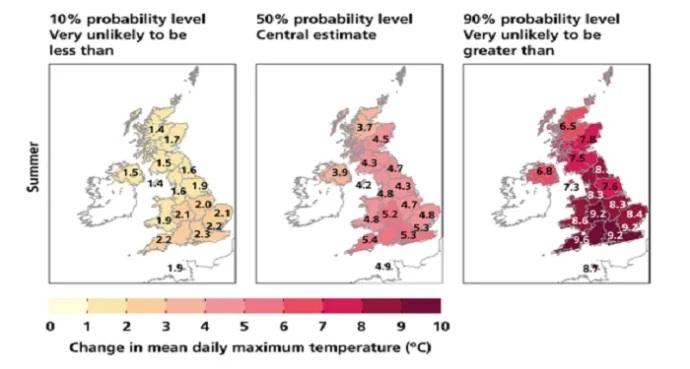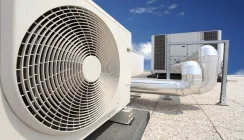Cool Lessons From The Summer Heatwave
There is a very good chance that we will always remember the UK summer of 2018. Week-long heatwaves and an average temperature of 15.8˚C saw this summer narrowly beat the previous record temperature levels of 1976. The summer months of June and July were also notably dry, although August seemed to return to more average conditions.
Cooling Industry Implications
So, what did this mean for the cooling industry and those reliant on their air conditioners? The first thing we noticed was a rapid call in rate from potential UK clients whose air conditioners were alarming due to their loading and the ambient temperatures they were working within. Across the industry this led to more rental units being rushed to sites along with HVAC installation teams and maintenance personnel.
The second thing to note was that the HVAC industry was taken by surprise, at a time when most air conditioner factories were heading into their summer shutdown period. Supply chain stocks started to quickly dry up and lead times for new air conditions extended quite dramatically.
When you also factor in that the heatwave was Europe-wide, you can start to see the scale of problem. Those server room and datacentre operations with little spare capacity or resilience faced desperate times and may well do so again in the future. The summer of 2018 was not a one off event.
Temperature Rise Warnings
The summer heatwave lead to many more discussions about the causes for global warming and the need to reduce one of the principle causes: emissions.
The UK is already leading the world in terms of tackling climate change. Since 1990, UK emissions are down more than 40%. However, worldwide emissions are still too high and are not falling quickly enough with many predicting that summers like that of 2018 could become the norm in countries like the UK.
In terms of forecasts, the UK Met Office issued the UK Climate Projections in November 2018 to illustrate a range of future climate scenarios up to 2100. The predictions include:
- The chance of a summer as hot as 2018 is around 50 % by 2050
- Summer temperatures could be up to 5.4°C hotter by 2070
- Winters could be up to 4.2°C warmer by 2070
- Sea levels in London could rise by up to 1.15 metres by 2100
- Average summer rainfall could decrease by up to 47 % by 2070 and there could be up to 35 % more precipitation in winter
For more information on emissions and UK climate projections see: https://www.metoffice.gov.uk/news/releases/2018/ukcp18-launch-pr
Climate Control Reviews
Winter in the UK can seem almost bearable given last summer’s heatwave and it is all too easy for some to forget just how hot it was. However, the winter period provides an ideal opportunity for UK based server room and datacentre operators (from small to hyperscale) to review their current climate control operations. Who knows, the summer of 2019 will be even hotter and set a new record!
Cooler outside ambient temperatures provide the ideal breathing space to review climate control operations in a less hectic and more pragmatic manner than when fans and filters are overloaded and systems are in alarm conditions.
Climate Controls Checklist
At Server Room Environments we would recommend the following summary checklist of areas to cover:
- Cooling system arrangements: wall, ceiling, in-row or complete room
- System safety margins i.e. running at less than 80% of capacity
- Redundancy in terms of N+X resilience
- Thermal profiles, hot spots and airflows at the rack and room levels
- Energy efficiency and Total Cost of Ownership (TCO) projections
- Maintenance contracts and emergency response plans
- Onsite storage of temporary air conditioners
- Disaster planning, Cloud storage and mirror sites
- Building Management System integration and reporting
- Temperature and humidity alarm monitoring
There is no doubt that some IT and Facilities Managers will take the time this winter to review their climate control systems. They will take steps to ensure that summer heatwaves like the one of 2018, present a managed or no risk to their server room and datacentre operations.
Others may be inclined to continue to run too close to the edge and risk operational reliability. For those who want to take the risk it is important to remember that heat kills electronics and is a sign of inefficiency. When you continuously run an electrical or electronic system at near to or above full capacity this can lead to a rapidly reducing working life. Put simply, heat ages components, assembles and complete systems and can lead to sudden and dramatic failures. Unexpected labour and replacement component costs can occur which may not be covered by an air conditioning maintenance contract. Other costs can be associated with cooling system failures including non-productive downtime.
So if you want a ‘takeaway’ from the summer of 2018, consider reviewing your climate controls with the checklist we have described. Our team of HVAC qualified project managers are always available to give advice and carry out a complete site survey.
Server Room Environments are specialists in all aspects of building HVAC systems. We work with several air conditioning and HVAC controls manufacturers and are completely independent. This allows us to propose the right solution for our clients and ensure that their buildings are ready to face the future with confidence in their cooling systems.


























